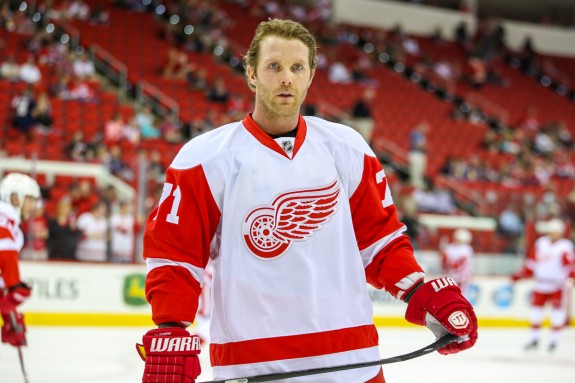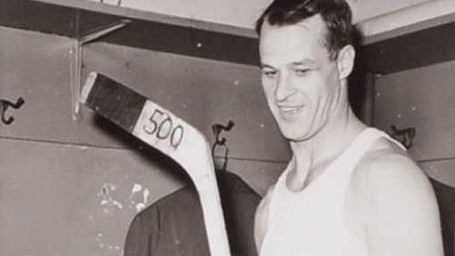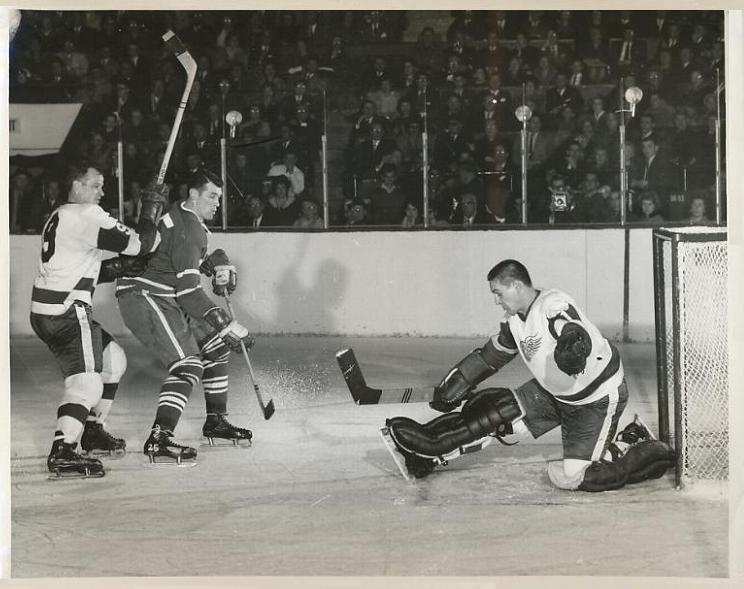At the end of the playoffs, the Conn Smythe trophy is awarded to the player deemed to be the most valuable player of the playoffs. More often than not, the honor is bestowed to a player on the team that won the Stanley Cup. However, we all understand that hockey is a team sport and that one individual is not entirely responsible for his team’s success. There are usually one or two individuals that fly under the radar but ultimately make the crucial plays that allow their team to win a championship. Which players were the unheralded stars on each of the Red Wings’ championship teams? We all know about Steve Yzerman, Gordie Howe, and Sid Abel. It’s time to bring the names of guys like Tomas Holmstrom, Tony Leswick, and Earl Robertson to the forefront. While the Conn Smythe Trophy was not presented until the 1964-1965 season, we will still recognize the unheralded stars from the earlier seasons.

1935-1936
The Stars
Back in 1935-1936, the Wings were led by coach Jack Adams and a top line of Marty Barry, Larry Aurie, and Herbie Lewis. That season, Barry finished 2nd in the NHL in scoring Lewis finished 9th. In the playoffs, Barry, Lewis, and Aurie combined for five goals and nine assists in seven games to help carry the scoring.
The Unheralded Star
Entering the 1935-1936 season, Normie Smith had a career record of 17-23-6 and had never appeared in the playoffs. The 1935-1936 season saw him post a 24-16-8 record with a 2.04 GAA and two shutouts. However, many people still doubted his ability to carry a team. Smith responded by posting a 6-1 record with a 1.34 GAA and two shutouts in the seven playoff games. Smith will perhaps be best remembered for his unbelievable Game 1 performance in the first round against the Montreal Maroons. In a Game 1 that lasted an NHL record 176:30, Smith stopped 89 shots en route to a 1-0 shutout victory. He followed that up with a 3-0 shutout in Game 2, before finally relenting a goal in Detroit’s 2-1 Game 3 victory. For that first round, he kept the Maroons off the scoreboard for an NHL-record 248 minutes and 32 seconds and he finished the series with a 0.20 GAA.
1936-1937
The Stars
Buoyed by the success of the previous season, goaltender Normie Smith won the Vezina Trophy as the best goaltender. Marty Barry won the Lady Byng Trophy and Barry, Smith, Larry Aurie, Ebbie Goodfellow, and coach Jack Adams were all selected to the NHL’s First All-Star Team.
The Unheralded Star
In the playoffs, the Wings were beset by injuries. Aurie broke his leg towards the end of the regular season, defenseman Orville Roulston broke his leg, captain Doug Young broke his leg, and All-Star goaltender Normie Smith was hurt early on in the playoffs. The injury to Smith was perhaps the most devastating. Montreal Canadiens manager Cecil Hart was actually quoted as saying “I don’t see any reason why we shouldn’t win it”. The Wings were forced to call-up minor league goaltender Earl Robertson and he took over in Game 4 of the best-of-five series with the Wings leading the series 2-1. Robertson lost Game 4 3-1, but after that game, he rallied to win Game 5 to get the Wings to the Stanley Cup Finals against the Rangers. The Wings got down 2-1 in the series and facing elimination in Game 4, Robertson turned his game up again. Robertson shut out the Rangers in Games 4 and 5 to clinch the Stanley Cup for the Wings.
1942-1943
The Stars
The Wings were loaded with balance as goaltender Johnny Mowers and defenseman Jack Stewart both made the NHL First All-Star Team, but no player finished in the top-10 in scoring. The team was led by captain Sid Abel as well as forwards Syd Howe, Mud Bruneteau, and Carl Liscombe.
The Unheralded Star
Mud Bruneteau will never be a household name. When you think of the 1942-1943 Red Wings, you think of Sid Abel, Syd Howe, and Johnny Mowers before you think of Bruneteau despite the fact that Bruneteau finished 2nd on the team in scoring. In the Cup Finals, the Red Wings were facing the Boston Bruins, the team that had swept them in the 1941 Finals. The Wings needed a strong start and lo and behold, Bruneteau stepped up. Bruneteau netted a hat trick in Game 1 to set the tone for the series. The Wings went on to sweep the Bruins and clinch the team’s third Stanley Cup.
1949-1950
The Stars
Most Red Wings fans are familiar with the superstars on this team. Sid Abel, Gordie Howe, Ted Lindsay, Red Kelly, and Marcel Pronovost led the team to a first place finish. Lindsay, Abel, and Howe, the “Production Line”, finished first, second, and third respectively in NHL scoring.
The Unheralded Star
These playoffs saw near disaster strike. In Game 1 of the first round, Howe got tangled up with Toronto’s Ted Kennedy and he flew headfirst into the boards. The collision caused a fractured skull and severe brain damage and many thought that Howe would not make it through the night. Surgeons were able to relieve the swelling in his brain but his playoff run was done. Forward Gerry Couture picked up the scoring slack, scoring five goals and nine points in 14 playoff games to lead the Wings in scoring. The 1950 championship over Toronto was finally sealed, and this victory was the first of five series victories over the Leafs in a span of seven years.

1951-1952
The Stars
This 1951-1952 Detroit Red Wings team may legitimately be the best team ever assembled in NHL history. The Wings recorded 44 wins and 100 points despite only playing 70 games. The “Production Line” again finished 1-2-3 in scoring and Terry Sawchuk won the Vezina. Howe, Lindsay, Sawchuk, and defenseman Red Kelly all were selected to the NHL’s First All-Star Team. In the playoffs, the Wings actually swept both rounds, going 8-0. Even more impressive, the Wings did not allow a single goal on home ice during the playoffs. For those with a sharp memory, this is the season where the octopus tradition was started.
The Unheralded Star
Well the Wings really didn’t need an unheralded star to perform in the playoffs, with Sawchuk recording a shutout in 4 of the 8 playoff games. Sawchuk was unbelievable, posting a 0.63 GAA and .977 SV% in the playoffs, but if we are looking for an unheralded star, center Metro Prystai managed to tie for the team lead in playoff scoring with two goals and five assists.
1953-1954
The Stars
Lindsay, Howe, and Kelly were all NHL First All-Star Team selections. Sawchuk was a Second Team choice. Alex Delvecchio was awesome. Same old, same old.
The Unheralded Star
Tony Leswick is part of one of the most unique pieces of NHL trivia. There are only two men in NHL history to settle a Stanley Cup final in overtime of Game 7. Leswick did just that in the 1954 finals, beating Montreal goalie Gerry McNeil high glove about five minutes into double overtime. Leswick also chipped in two other key goals during the Red Wings playoff run.
1954-1955
The Stars
Kelly, Sawchuk, Howe, Delvecchio, and Lindsay still haven’t gone anywhere. Lindsay did struggle during the 54-55 campaign, posting just 38 points on the season.
The Unheralded Star
When asked to name players from the 54-55 team, most people will name Sawchuk, Howe, Lindsay, and Delvecchio. A smaller majority will name Red Kelly. Almost no one will name Dutch Reibel. Interesting fact – Reibel actually led the 54-55 team in scoring, finishing four points ahead of “Mr. Hockey”. In the playoffs, Reibel continued to produce, tallying five goals and 12 points in 11 playoff games.

1996-1997
The Stars
This team was loaded with talent, but for five years, they had struggled to put it together in the playoffs. Captain Steve Yzerman, and forwards Sergei Fedorov and Brendan Shanahan led the charge up front. On the back end, all-world Nicklas Lidstrom and Vladimir Konstantinov shut down opposing forwards. Finally, in goal, Mike Vernon steadied the ship and ended up winning the Conn Smythe.
The Unheralded Star
Darren McCarty. There are so many things to talk about with McCarty. Detroit had struggled for years with the Colorado Avalanche as they let the Avs push them all over the ice. In the 1996 playoffs, forward Claude Lemieux wrecked Kris Draper’s face on the boards, igniting a rivalry for the ages. In March of 1997, McCarty took it to Lemieux, pummeling him into submission. Every Wings fan remembers that. However, most don’t remember that the brawl game actually went into overtime, where McCarty netted the game-winning goal. Avalanche goaltender Patrick Roy later stated that “Detroit won the Stanley Cup that night”. However, McCarty’s contributions didn’t end there. He scored the backbreaking goal in the Stanley Cup Finals, absolutely undressing Philadelphia Flyers defenseman Janne Niinimaa.
1997-1998
The Stars
The stars virtually remained the same, with the only difference being the subtraction of Vladimir Konstantinov after his horrific car accident and the substitution of Chris Osgood in goal. Steve Yzerman ended up winning the Conn Smythe Trophy as playoff MVP.
The Unheralded Star
Tomas Holmstrom is widely regarded as one of the greatest powerplay forwards in the history of the game. Back in the 1998 playoffs, Holmstrom showed why he could do more than just tip pucks. Holmstrom finished third on the team in scoring in the playoffs, recording seven goals and 19 points in 25 playoff games. Holmstrom was especially fantastic in the 2nd round series against the St. Louis Blues where he scored four goals and six points in the 4-2 series victory.
2001-2002
The Stars
Yzerman, Fedorov, Shanahan and Lidstrom, were still here, but for this Cup run, they were joined by future Hall of Famers Luc Robitaille, Brett Hull, Pavel Datsyuk, Dominik Hasek, and Chris Chelios. Needless to say, this team was loaded. Nicklas Lidstrom ended up winning the Conn Smythe as playoff MVP.
The Unheralded Star
Amidst all of Detroit’s Hall of Famers, there was another Hall of Famer who was definitely on his last legs. Igor Larionov, “The Professor” was 41 years of age in this season, but he still found a way to chip in 11 goals and 43 points in the regular season. In the playoffs, he contributed five goals and 11 points. In Game 3 of the Stanley Cup Finals, he scored the series-altering goal. The series was tied 1-1 and Game 3 was in triple OT. Larionov, the oldest player on the ice, found a way to score the game-winning goal and the Wings went on to win the series in five games. So while he was a Hall of Famer, he definitely flew under the radar on this team.
2007-2008
The Stars
On this team, Pavel Datsyuk and Henrik Zetterberg were the offensive dynamos and captain Nick Lidstrom and defensemen Brian Rafalski and Chris Chelios steadied the team on the backend. This team won the President’s Trophy and finished in the top-five in goals for and goals against. They were clearly a dominant team. Henrik Zetterberg won the Conn Smythe trophy as playoff MVP.
The Unheralded Star
It’s hard to call a 400-game winner unheralded, but that’s exactly what goaltender Chris Osgood was. Hell his nickname should probably be Mr. Underrated. The 2008 playoffs were no different. The Wings still had Dominik Hasek on the roster and tabbed him as their starter in the playoffs. Hasek lasted just four games, struggling mightily against the #8 Nashville Predators. The Wings were tied 2-2 in the series, and decided to turn to Osgood. Osgood proceeded to rattle off nine straight wins, posting a 1.56 GAA and .931 SV% during that stretch. Osgood finished the postseason with an incredibel 14-4 record, a 1.55 GAA, a .930 SV%, and a third Stanley Cup ring.
The stars always get their time to shine, but it’s important to highlight the role players who make it happen.